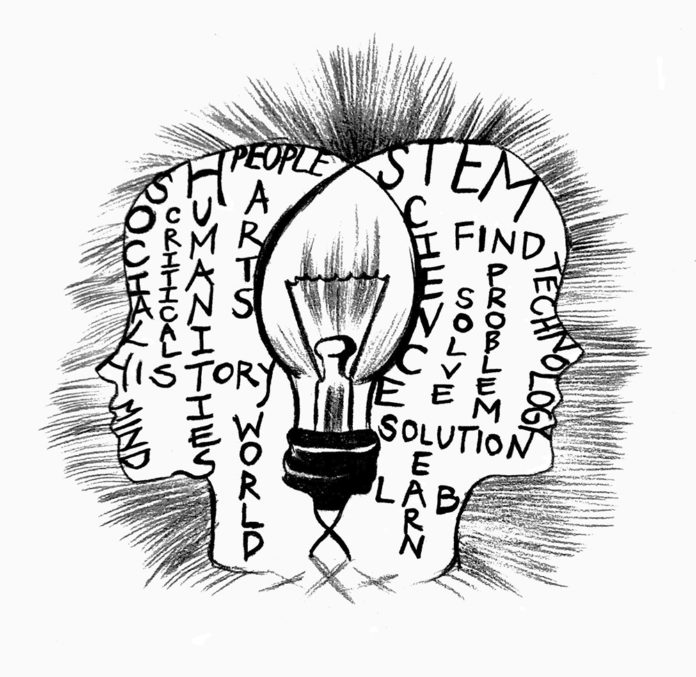In the higher education community, there is a clear divide separating STEM and the humanities. Students debate the superiority of their respective favorite, while academic communities — as well as society in general — prioritize STEM for the lucrative careers and benefits it provides. But in order to form a society capable of progressing in all fields, we cannot perpetuate this hierarchy. Instead, there must be a harmonious relationship between STEM and the humanities. While many people believe humanities have lost their bravado, they have a meaningful place in our education system.
Skeptics often question why an 18-year-old would assume hundreds of thousands of dollars in student loans debt to take English classes and study obsolete languages — they could pay a fraction of that and go to a school where their area of study will launch them into a high-paying job. I constantly find myself having this argument with my friends, who disagree with my decision to study obsolete languages, read Heidegger and discuss Eagleton’s validity. Even worse, a comprehensive understanding of the world comes at an absurdly high price; liberal arts colleges around the country are reaching record-breaking tuition costs. The rise in cost is partially to blame for the divide between humanities and STEM.
But we are social beings who function through communication, so we can’t ignore the communication skills and social context that humanities provide. Moreover, the claim that a humanities degree can’t lead to monetary success is false. According to Forbes, humanities majors may not earn the same amount as “professional and pre-professional majors like nurses and business majors” straight out of college, but later in life, their income surpasses those fields by $2,000 per year.
The liberal arts education system was built on the idea that citizens should have a breadth of knowledge so they can participate in and sustain the health of their democratic system. Without the foundation of reading, writing and analytical skills, people will simply lack the necessary tools to uphold the integrity of democracy. On a more personal level, studying humanities teaches me how to exist in this world, live with purpose and view the world with the greatest level of precision and accuracy possible. In my history, philosophy, English and foreign language classes, I learn how we interact as social beings, interpret meaning through language and dissect the driving forces behind our human actions.
All of these skills complement my learning in STEM courses. The beauty of the liberal arts education is that it fuses all areas of study, including STEM and the humanities, in order to arm students with the ability to go into any field that fascinates them. Davin Mckinley (sophomore), a Comparative Studies in Literature & Culture (CSLC) major, said that she approaches her academic career with the aim of becoming a well-rounded and educated person: “I have designed my academic career to be a life in itself as opposed to a means to a goal,” Mckinley said. That will make her a more informed individual and positive contributor to society, which will naturally lead to career opportunities down the line.
I also discussed the symbiosis of STEM and the humanities with Jacob Mackey, a professor in the CSLC department. “All domains of knowledge and all levels of knowledge should be mutually consistent, and if they are inconsistent, then somewhere there is a problem,” Mackey said. Without consistency, our emerging workforce will enter into their respective fields with just a portion of the knowledge that they could employ to enhance their career and impact others. In fact, STEM and the humanities don’t just go together in liberal arts colleges — they often work together in the real world. For example, STEM may be responsible for the next scientific discovery or mathematical theory, but skilled writers can translate those discoveries into coherent language for the public to understand.
To humanities majors who are worried about career opportunities upon graduation, I have somewhat hopeful news. Recently, an increasing number of employers across all industries have voiced their desire to have more humanities and liberal arts undergraduate applicants. Humanities majors offer a capable analytical and creative mind, which is a highly valuable asset in many fields. I look forward to a resurgence in the humanities on campuses across the country as more and more people look to broaden their intellectual focuses. Sign up for English classes; spend time analyzing the nuances in your Dickens novel and the historical significance surrounding scientific developments. Even if you are a committed STEM student, I vehemently urge you to dabble in courses on the other side and allow yourself to enrich your life and enhance your intellectual interests.
Sam Berger is a first year Comparative Studies in Literature & Culture major. He can be reached at bergers@oxy.edu.
![]()



































